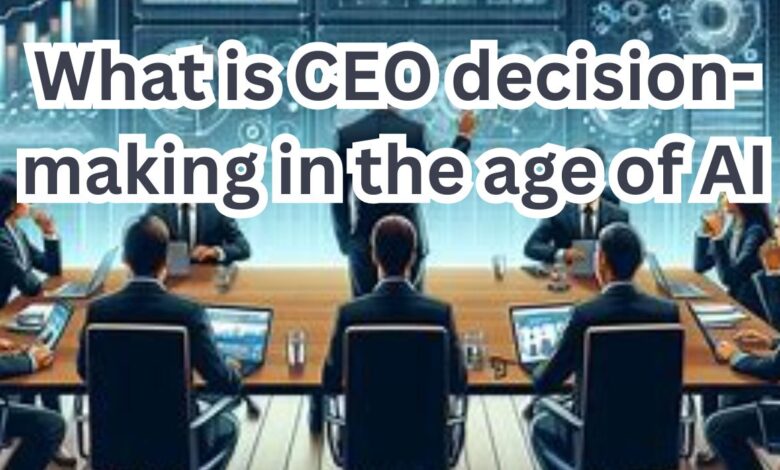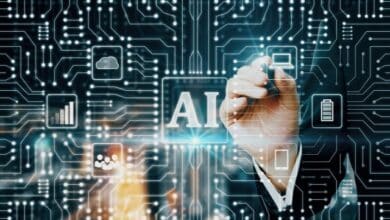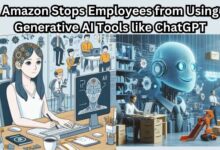What is CEO decision-making in the age of AI

In the rapidly evolving business landscape, one question stands out: What is CEO decision-making in the age of AI? This question is not just about understanding the role of a CEO, but also about exploring how Artificial Intelligence (AI) is reshaping the decision-making process at the highest levels of management.
AI, with its ability to analyze vast amounts of data and generate insights, is becoming an invaluable tool for CEOs. It’s transforming the way decisions are made, moving from intuition-based to data-driven strategies. However, there are some difficulties with this change. As we delve into this topic, we’ll explore the benefits, the potential pitfalls, and the transformative power of AI in CEO decision-making. This journey will provide a comprehensive view of the current state of AI in decision-making and its implications for the future of leadership.
The Evolution of Decision-Making in age of AI

Decision-making has been a fundamental aspect of human behavior and societal development. Traditionally, decisions were made based on intuition, experience, and sometimes even trial and error. These methods, while effective in certain contexts, were often limited by the individual’s knowledge and understanding.
However, the advent of the digital age brought about a significant shift in decision-making processes. The rise of data-driven decision-making marked a significant evolution from intuition-based to evidence-based management. This shift was driven by the increasing availability and accessibility of data, which provided a wealth of information that could be analyzed and used to inform decisions. By utilizing datasets, data-driven decision-making enables firms to make decisions more quickly, accurately, and consistently.
The introduction of Artificial Intelligence (AI) in decision-making has further revolutionized this process. AI, with its ability to analyze large datasets without error, has become an invaluable tool in decision-making. It allows for faster and more accurate decisions, enabling business teams to focus better on work relevant to their field. When an AI platform handles all or a portion of the data processing, AI decision-making becomes crucial.
AI is capable of handling complicated analysis, trend identification, data crunching, and anomaly detection. After that, the final choices are either fully automated or handled by a human.
This has led to a significant shift in the way decisions are made, moving from intuition-based to data-driven strategies, and now to AI-assisted decision-making.
AI and Its Impact
Artificial Intelligence (AI) is a revolutionary technology that has been transforming various sectors of society. It is a broad term that refers to computer systems capable of performing tasks that historically required human intelligence, such as recognizing speech, making decisions, and identifying patterns. AI encompasses a range of abilities including learning, reasoning, perception, problem-solving, data analysis, and language comprehension.
Artificial Intelligence (AI) is no longer just a futuristic concept; it’s happening now and revolutionizing various industries like banking, healthcare, and transportation. AI’s impact extends to technology, where computers can analyze huge amounts of data and use their learning to make fast and accurate decisions. This helps businesses and organizations save time and make smarter choices.
The impact of AI on human society and bioethics is profound. It is changing not only the way we do things, how we relate to others, but also what we know about ourselves. AI is influencing a societal and economic shift towards increased automation, data-driven decision-making, and the integration of AI systems into various economic sectors and areas of life, impacting job markets, healthcare, government, industry, and education.
CEO Decision-Making in the Age of AI
In the age of AI, CEO decision-making is undergoing a significant transformation. AI is empowering CEOs to make data-driven decisions with real-time insights. Machine learning algorithms can analyze vast datasets, enabling leaders to identify trends, predict market movements, and optimize business strategies.
For example, AI is being employed more and more in wealth management at Ant Financial, where it is now used for loan approval. Restrictions on digital content are another way that tech giants like Netflix, Microsoft, and Facebook use reinforcement learning algorithms. In executive-level meetings, Salesforce’s Einstein AI program assists leaders in making critical decisions.
But there are several difficulties in incorporating AI into decision-making procedures. According to three out of four CEOs (75%) the company with the most sophisticated generative AI will win. However, only 7% of businesses now use AI in critical strategic choices like financial planning and strategy formulation. This implies that although a lot of CEOs are aware of AI’s potential, there is still room for improvement in terms of its use.
Moreover, two out of three CEOs are acting without a clear view of how to help their workforce with the disruption and inevitable transitions AI will bring. A lack of clarity is impeding decision-making and investments. Therefore, CEOs need to understand not only the benefits of AI but also its implications on their workforce and business operations.
The Future of CEO Decision-Making with AI
The future of CEO decision-making is being influenced by AI advancements. Over 40% of CEOs already use AI to help them make decisions. How well AI is used in strategic decision-making will determine future competitiveness. Knowing how to work with AI and deciding when to let it handle decisions will be crucial skills for decision-makers.
AI is changing how decisions are made. The organization with the best AI will likely have an advantage. But right now, only a small fraction of companies use AI for big decisions like strategy and finance. This shows there’s still a gap between recognizing AI’s potential and using it effectively.
As AI gets better, we’ll need to figure out how to use it in important decisions. Trust, access, and how well AI fits into decision-making processes will decide how fast and how much it’s adopted.
Conclusion: The Transformative Power of AI in CEO Decision-Making
The Age of AI has changed how CEOs make decisions. Using AI for smart choices based on data is reshaping their role and the future of businesses. But, it’s not easy – integrating AI into decision-making has its challenges. CEOs need to understand AI well to navigate its capabilities and effects.
Looking ahead, staying updated on AI developments is a must for CEOs. Adapting decision-making processes is key. The future of CEO decision-making with AI looks promising but comes with challenges. It’s about balancing the benefits of AI while handling its implications.
AI transforms CEO decision-making profoundly. It’s not just about better choices but also about creating a better future for businesses and society.






